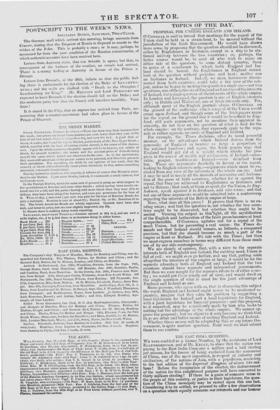TOPICS OF THE DAY.
PROPOSAL FOR UNITING ENGLAND AND IRELAND. O'CONNELL is said to intend that meetings for the repeal of the Union shall be held in a steam-boat, to be moored without the jurisdiction of the Irish Government. He would have shown more sense by proposing that the question should not be discussed, either by Englishmen or Irishmen, except in a ship to be sta- tioned midway between the two countries ; or, perhaps, the better course would be, to send all who wish to argue on either side of the question, to some distant country, there to arrive at a conclusion by which both Ern,riand and Ire- land should be hound. An Englishman in England cannot 'look at the question without pn:judice and heat ; neither can an Irishman in Ireland. Indoed, no Mall, howsoever discon- nected from both countries, could take a fair view of the sub- ject, unless he began by ma kina the question a single one—not two questions, one of the interests of England and allot lier of tlie interests of Ireland, but a single question of the interests of the whole empire. In London and Liverpool, the question is one of English interests only; in Dublin and Waterford, one of Irish interests only. For, although most or the English journals abuse O'CONNELL on the ground of the sufferings which a repeal of the Union would entail upon Ireland, and though some of the Irish papers argue for the repeal on the ground that it would be beneficial to Eng- land, still such arguments, not to mention their apparent in- sincerity, do not bear on the question of what is best for the whole empire : on the contrary, they expressly apply to the sepa- rate or rather opposite interests of England and Ireland. For example, the Times declaims, after its usual powerful manner, on the advantages which Ireland derives linm the generosity of England in bearing so large a proportion of the national burdens ; and again, the Irish papers urge that England would get rid of a weight which cheeks her two- gress in the career of wealth and eivilizaLion, if Ireland—mise- rable, pauper, troubleso.ne Ireland—were de acied from her. These are arguments decidedly in favour of the repeal, looking to English interests only,—arguments which must be ex- cluded from any view of the interests of the whole empire. And it may be said of nearly all the morsels of reasoning and declama- tion of the press of both countries, whether for or against the repeal, that they are addressed to Englishmen or Irishmen, and not to Britons ; that such of them as speak fir the Union, to Eng- lishmen, speak against it to Irishmen, and rice versa; and that not one of these arguments would be admitted into a controversy regarding the interests of the British empire at large. • Now, what does all this prove ? It proves that there is no ex- isting union ; and that the question is, not whether the two coun- tries ought to be dissevered, but whether they ought to be united. Viewing the subject in thislight, all the mystification of the English and botheration of the Irish press becomes at least comprehensible. O'CONNELL agitates not for a repeal of the mock Union, but for preventing a real union : the Times de- mands not that Ireland should remain, as hitherto, a conquered province, 'but that she should become as much a part of the empire as Kent or Rutland. We side with the Times; but then we must express ourselves in terms very different from those made use of by our able contemporary.
We are clearly of opinion, that, with a view to the separate interests both of England and Ireland, the existing mock Union is full of evil : we might even go farther, and say that, putting aside altogether the interests of the empire at large, it would be for the separate advantage both .of England and Ireland that the two countries should have separate and independent governments. But then we care nought for the separate intereAs of either coun- try ; we would put these wholly out of view, and would dwell on the single question of what is most for the joint advantage of England and Ireland as one.
Some persons, who agree with us, that in discusing this subject the words England and Ireland ought never to be mentioned se- parately, imagine that they solve the problem by suggesting a local legislature for Ireland and a local legislature for England, with a joint legislature for Imperial purposes : and this proposal, be it remarked, may be consistently made by him who looks to nothing but the advantage of the whole empire. We cannot ap- prove the proposal; but we object to it only because we think that there are other and better means of uniting England and Ireland.
Whether thosa means will be adopted by this or any future Go- vernment, is quite another question. Next week we shall submit them to our readers.


























 Previous page
Previous page